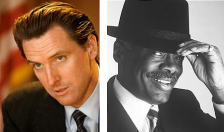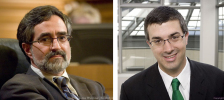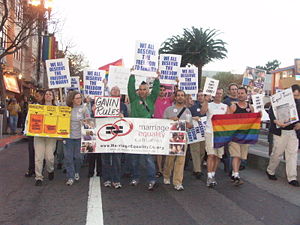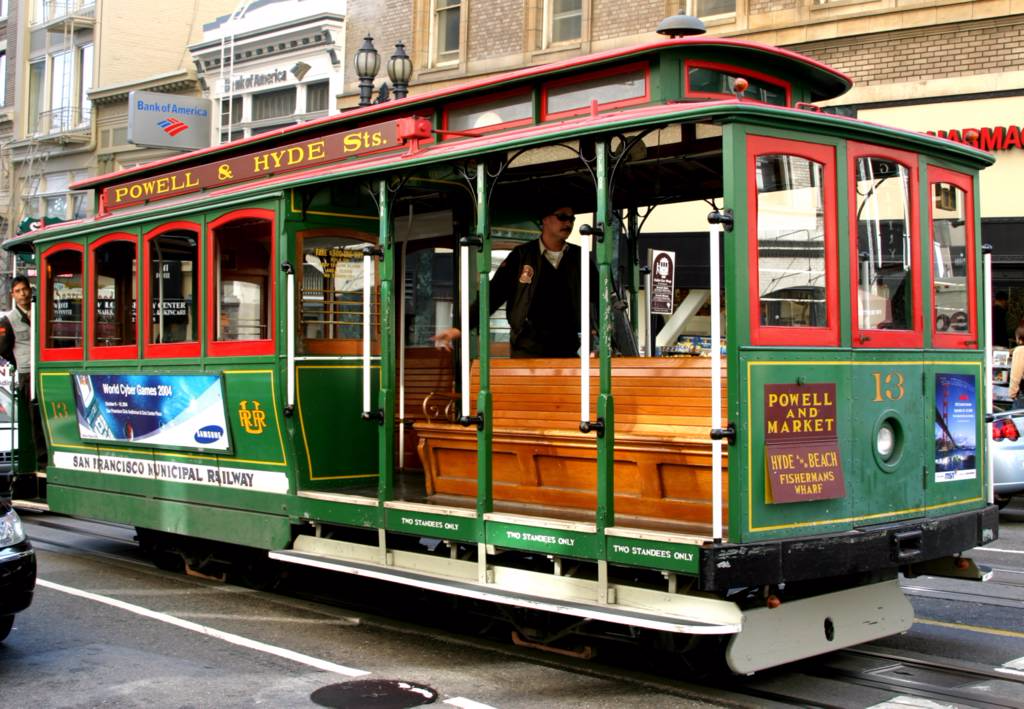December 19, 2001
THE LONG MARCH
S.F.’s progressive reformers helped win the city attorney’s race. But the big test will come in the March elections.
By Savannah Blackwell
At 10 p.m. on election night, Dec. 11, the faces of the crowd gathered at Don Ramon’s, a Mexican-food joint in a gritty part of South of Market, started to show surprise – and then glee.
The latest results had just come in, and it was clear that a huge upset was in the making. Former deputy mayor Jim Lazarus, the political heir of Sen. Dianne Feinstein, was clearly losing his bid for city attorney. Lazarus outspent his opponent two to one, running waves of television ads fueled by tens of thousands of dollars from the city’s old corporate establishment, including Pacific Gas and Electric Co.
Instead, a relatively unknown maritime attorney named Dennis Herrera was headed for victory – after a campaign that had relied on an unusual strategy. In a low-turnout election, normally dominated by conservatives, Herrera (at best a political moderate) made a conscious decision to run to the left. He posed for campaign flyers with Sup. Tom Ammiano. He portrayed himself as a foe of PG&E (and Lazarus as a PG&E ally). He distanced himself from Mayor Willie Brown. He tapped public power campaign manager Ross Mirkarimi and tenant organizer Robert Haaland to help get out the vote in neighborhoods such as the Castro, the Mission, and Bernal Heights.
It won him the election – and perhaps more important, it sent a profound message to the San Francisco political world. The balance of power is shifting away from the Brown-Burton machine and toward the grassroots coalition that elected a reform-oriented Board of Supervisors a year ago.
‘The lesson of [Tuesday] night shows you can’t win in this town without the progressives,’ Sup. Aaron Peskin told the Bay Guardian. Dennis Herrera had to move to the left, and that is a very good thing.’
But a much bigger test is looming for the reformers in town – and it’s just a few months away.
The March election will include some critical races that may determine whether progressives can stand up to the full, focused power of the machine and whether they can win a high-stakes campaign for state assembly. Jeff Adachi, former chief assistant public defender, is trying to wrest the Public Defender’s Office away from Kim Burton, the daughter of state senator John Burton who has pulled out all the stops to save her job. And former supervisor Harry Britt is trying to win the Democratic primary for the state assembly’s 13th District against Sup. Mark Leno, former school board member Steve Phillips, and attorney Holli Thier.
Leno, first appointed to the board by Brown, is a political moderate (by San Francisco standards). Phillips is seen as a Brown ally; most observers say Thier doesn’t look as if she’ll be a major factor in the race.
The March elections, observers agree, have political ramifications that go far beyond the qualifications of Britt and Adachi for elective office.
“The question is, in the post-Brown era of San Francisco politics, what will the face of San Francisco politics look like?” Britt told us. “Will we create a really effective progressive leadership that will have the mandate to make changes in Sacramento and beyond?”
“I think the Britt-Leno race is really key,” AIDS activist Jeff Sheehy said. “Because that has the potential to bring the disparate forces [in the progressive community] together. If Britt wins, that will create a huge base, with the board president, the assembly, and the supervisors. It creates a countermachine and solidifies the newly reemerging union of progressives, the gay community, and labor. Those three came together in one alliance in the beginning of the movement.”
“I think the Adachi-Burton race and the Britt-Leno race are a test to see if the existing political machine still has any juice left in this town,” Sup. Gerardo Sandoval told us. “If the machine wins those races, that tells us a lot about the mayor’s race, and it also sends a signal to the business community that has been funding the machine for so many years, that they can continue with the status quo … In the March election we need to go for the knockout punch.”
At the same time the Democratic County Central Committee – a little-known panel with a good political influence – will be up for grabs.
Britt comes back
Harry Britt left the political scene in 1992. But for 10 years before that, he was one of the leading figures in the city’s progressive movement. His tenure at the Board of Supervisors marked the creation of the city’s first civilian police review board, the city’s first efforts at officially recognizing gay partners as married couples, and the passage of the landmark growth-control law that seeks to protect San Francisco neighborhoods and historic commercial districts. Britt was a strong advocate for tenants. And he served during a time when a Republican ruled the White House while progressives in San Francisco fought to show that this city was very different. Britt says his reemergence is coming during similar times.
“Harvey Milk taught me that you can use political power to create accountability to real people,” Britt said. “There’s a real war on for the soul of the Democratic Party and accountability in Sacramento. There are too many unhealthy power relationships going on outside of San Francisco making issues such as education and healthy families vulnerable. Somebody has to stand up to that, and that’s what I like do.”
The early tenure of Sup. Mark Leno showed him more or less in lockstep with the rest of the mayor-controlled board. He frequently sided with then-supervisors Barbara Kaufman, Mabel Teng, Michael Yaki, and Leslie Katz, including on votes to put an anti-tenant measure (Proposition E) on the ballot and legislation cracking down on the homeless. But he also took a big political risk with moderate voters – and won a big victory – pushing for and winning full health benefits for transgendered city employees.
Perhaps in preparation for the race to keep his seat in 2000, Leno made a marked move to the left by restricting the development of “monster homes,” which angered developer Joe O’Donoghue, and by opposing the mayor’s pro-growth proposition K in November 2000. He supported public power this November.
So it’s unfair to call Leno a machine candidate, but he’s clearly more of a centrist than Britt.
“If Leno wins, it pushes the queer community into the moderate camp,” Sheehy said. “If he goes to Sacramento, the community will have shifted its allegiance from the times of Harvey Milk. You won’t be able to count on the queer community as an anchor of the progressive movement.”
Leno has supporters in the progressive and reform movements, and even his critics agree he wouldn’t be a bad assembly member. But there’s much more to the race than that. The person who represents San Francisco in the state assembly has tremendous political clout at home – and there’s a real difference between how Britt would use that and how Leno would. Sheehy and other progressive leaders agree, for example, that a Leno win would not bode well for Ammiano’s all-but-certain campaign for mayor. Leno is not likely to be a strong Ammiano backer; Britt almost certainly is.
For the record, Leno says “it’s far too early to talk about [the mayor’s] race – it’s more than a year away. We don’t know who’s going to be in it.”
“Both Leno and Kim Burton supported public power, but what other issues and candidates will they support?” asked tenant organizer Haaland, who is working full-time on the Britt campaign. “Leno’s endorsements will be machine candidates. He supported Lawrence Wong over Aaron Peskin for District Three supervisor – I don’t think he supported any of the reform supervisors.”
Although a lot of the inside talk focuses on Britt and Leno, it would be a mistake to write off Steve Phillips, who says he has already raised $120,000. Phillips had a mixed record on the school board, and his ties to Brown became clear just six weeks before last year’s school board election when he resigned his seat on the board. He said he was stepping down so that the mayor could appoint an African American, who would then have an advantage at election time. Many observers, however, suspected that Phillips was also trying to curry the mayor’s favor by giving him more sway over the school board election.
About one week later, when the mayor’s pick withdrew from the race, citing personal concerns, Phillips quickly heeded the mayor’s call and returned to the board and served out his term.
Phillips is vulnerable on a key labor issue: the privatization of public schools by Edison Schools Inc. Though sometimes critical of Edison, Phillips always took the company’s side when it mattered. For example, when dozens of teachers threatened to quit the school, he drafted a toothless resolution that essentially said the company should try to keep the teachers from leaving.
Phillips told us he’s running “to make sure the progressive movement speaks to the issues affecting communities of color. You can’t talk about progressive politics without talking about racial justice.”
That’s an area where the progressive-reform movement, which has had only limited success in attracting black voters, is seriously vulnerable.
Politics of inheritance
Haaland and other political insiders say the race between Burton and Adachi for public defender will be another major bellwether of the success of the progressive movement.
“Both races are very telling,” artist and neighborhood planning activist Debra Walker, who is also working on the Britt campaign, told us. “Obviously the Burton-Adachi race raises the issue of the venerable old namesake.”
Adachi’s background certainly differs from Burton’s. He grew up “on the other side of the tracks,” as he puts it, in South Sacramento. The son of an auto mechanic and a lab technician, both of whom spent World War II in Japanese internment camps, Adachi started working at age 13, helping out in his dad’s car shop and plucking ducks for hunters at 40¢ a bird. He worked his way through Sacramento City College, UC Berkeley, and Hastings Law School and went to work in the San Francisco Public Defender’s Office – “the only law job I ever wanted to do,” he told us.
Adachi rose to become second in command in the office, and in 1998, Jeff Brown, the longtime public defender, started talking about retirement and told Adachi he’d support him for the job.
The in January, Gov. Gray Davis appointed Jeff Brown to the California Public Utilities Commission, and Mayor Willie Brown immediately named Kim Burton to the public defender’s post. Burton quickly fired Adachi, and Jeff Brown withdrew his endorsement.
“This election and what’s happened to the office represents everything that’s bad and distasteful and shameful about San Francisco’s local government,” Adachi told us. “We’ve drifted to a point where residents have come to expect nepotism and favoritism. But I’m somebody who’s standing up to that, to what has been going on for a very long time and is very wrong.”
But defeating Burton won’t be easy: John Burton has already helped raise more than $700,000 for his daughter’s campaign – an unprecedented amount for a public defender’s race – and is using all of his clout to line up endorsements. And the senior Burton didn’t get where he is by being a political fool.
“Never underestimate John’s political savvy,” pollster David Binder told us. “He is trying to reach out to the left so that Kim is not viewed as a machine candidate who needs to be turned out of office.”
Party power
Then there’s the Democratic County Central Committee election. It’s hardly a high-profile position, but some say it’s critical for the reformers to win control of the panel, which determines the official endorsements of the local Democratic Party.
Binder said that the March race for 24 slots on the committee is crucial to the survival of the progressive movement. If the DCCC’s composition hadn’t changed dramatically in March 2000, from mostly machine members to one-half reformers, many of the reform supervisors would have lost at the polls, Binder said.
Here’s why: Because of the split between reformers and machine-friendly interests on the DCCC, reformers succeeding in getting the membership to agree not to endorse any candidates for supervisor. That neutralized the DCCC’s influence on the supers’ races and kept it from being the usual booster for the mayor’s favorite candidates.
The DCCC also supported public power this fall, which gave the campaigns for Propositions F and I a huge lift.
“The county committee must have a majority of reformers [for the movement to continue],” Binder told us. “That’s a real key to the tone of the endorsements for the supervisors race in 2002 and for the mayor in 2003.
Sheehy agrees, “You gotta have the majority on the DCCC,” he said. “Then the majority can embarrass the electeds into supporting major issues we care about. We can control the debate.” (This is already happening to a certain extent: DCCC sent out mailers urging yes on both F and I.)
Public power campaign director Mirkarimi warned that the left needs to keep its momentum going between electoral campaigns. He said progressives need to focus not just on elections but also on organizing around key issues, such as public control of vital resources, civil and housing rights, social justice, and keeping corporations in check.
“What we do to effectuate success in March needs to be calculated so that March’s results position us well for November and then thereafter,” Mirkarimi said. “It has to be stitched into a much larger picture – so that the movement is sustained not just from election to election but from coalition to election. I don’t believe we’re sustaining progressive policy and coalitions in San Francisco. I think the March election is a major stepping-stone toward achieving this.” ■
Tali Woodward contributed to this story.







